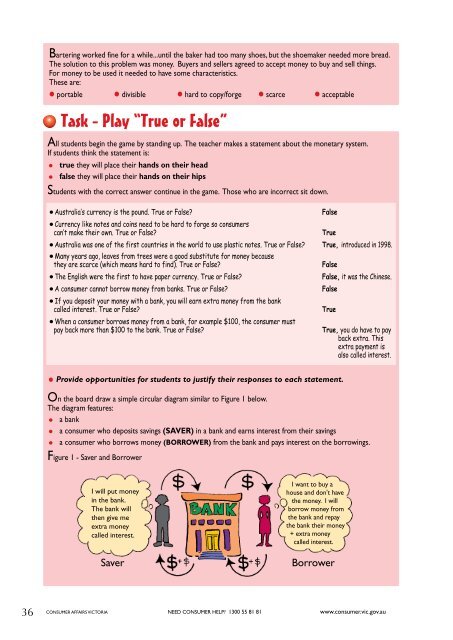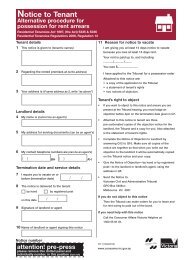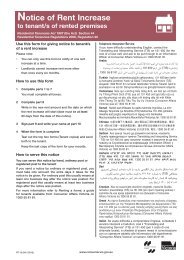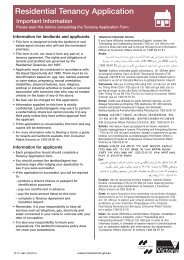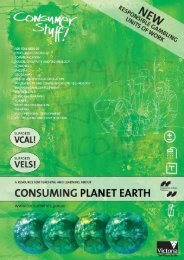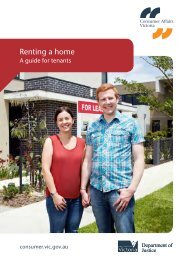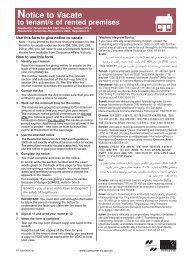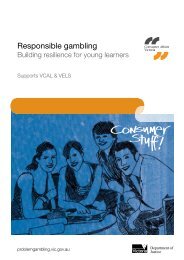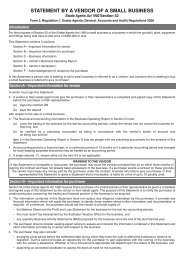Consumer Stuff for kids (PDF, 6.2 MB) - Consumer Affairs Victoria
Consumer Stuff for kids (PDF, 6.2 MB) - Consumer Affairs Victoria
Consumer Stuff for kids (PDF, 6.2 MB) - Consumer Affairs Victoria
You also want an ePaper? Increase the reach of your titles
YUMPU automatically turns print PDFs into web optimized ePapers that Google loves.
Bartering worked fine <strong>for</strong> a while...until the baker had too many shoes, but the shoemaker needed more bread.<br />
The solution to this problem was money. Buyers and sellers agreed to accept money to buy and sell things.<br />
For money to be used it needed to have some characteristics.<br />
These are:<br />
portable divisible hard to copy/<strong>for</strong>ge scarce acceptable<br />
All students begin the game by standing up. The teacher makes a statement about the monetary system.<br />
If students think the statement is:<br />
•<br />
true they will place their hands on their head<br />
false they will place their hands on their hips<br />
Students with the correct answer continue in the game. Those who are incorrect sit down.<br />
•Australia’s currency is the pound. True or False? False<br />
Currency like notes and coins need to be hard to <strong>for</strong>ge so consumers<br />
•<br />
Provide opportunities <strong>for</strong> students to justify their responses to each statement.<br />
On the board draw a simple circular diagram similar to Figure 1 below.<br />
The diagram features:<br />
a bank • a consumer who deposits savings (SAVER) in a bank and earns interest from their savings<br />
• a consumer who borrows money (BORROWER) from the bank and pays interest on the borrowings.<br />
•<br />
can’t make their own. True or False? True<br />
•Australia was one of the first countries in the world to use plastic notes. True or False? True, introduced in 1998.<br />
Many years ago, leaves from trees were a good substitute <strong>for</strong> money because<br />
•<br />
they are scarce (which means hard to find). True or False? False<br />
•The English were the first to have paper currency. True or False? False, it was the Chinese.<br />
A consumer cannot borrow money from banks. True or False? False<br />
•<br />
Task - Play “True or False”<br />
If you deposit your money with a bank, you will earn extra money from the bank<br />
called interest. True or False? True<br />
•When a consumer borrows money from a bank, <strong>for</strong> example $100, the consumer must<br />
pay back more than $100 to the bank. True or False? True, you do have to pay<br />
back extra. This<br />
extra payment is<br />
also called interest.<br />
Figure 1 - Saver and Borrower<br />
I will put money<br />
in the bank.<br />
The bank will<br />
then give me<br />
extra money<br />
called interest.<br />
I want to buy a<br />
house and don't have<br />
the money. I will<br />
borrow money from<br />
the bank and repay<br />
the bank their money<br />
+ extra money<br />
called interest.<br />
Saver Borrower<br />
36 CONSUMER AFFAIRS VICTORIA NEED CONSUMER HELP? 1300 55 81 81 www.consumer.vic.gov.au


